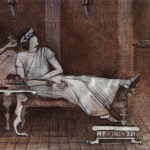I have great respect for ACGME leadership, some of whom I have known and worked with for many years, and their admirably noble conception of a superb GME [graduate medical education] system responsive to perceived public and regulatory expectations. I am concerned that we have embarked on a new approach to GME [that is] competency based; however appealing, [this] has not yet been shown to be better than what we have been doing, and [its] implementation has not been fully studied. I am not convinced that our product has necessarily been faulty. And we must now change at enormous cost, both in dollars and effort.
It’s been said that the time to fix something is before it becomes broken, not after. But I just don’t countenance the pervasive alterations purveyed. We have seen other similar expensive and extensive innovations recently imposed on us, [whose] anticipated value has not been realized—work hours, the EMR, the patient-centered medical home and maintenance of certification, for example. I am concerned that this may be that.
Q: You’ve written about how much you enjoy literature, including poetry. Are you at all concerned that technology is eroding our attention spans and, hence, making our society (and trainees) less apt to read, study and think critically?
A: I think the transformations in society and in medical education as a consequence of technologic advances challenge us to continue to teach our core messages and values about medicine to new generations in novel ways. It’s not easy for me as an aging rheumatologist, but there are extraordinary opportunities here. I am tremendously impressed with today’s medical students and residents: They are bright, curious, worldly, socially aware and deeply committed to [doing] good. We should be proud of them and embrace our roles in preparing them to follow us.
I recall coming across something by David Rogers, a giant in academic medicine, about changes in the landscape of medical education and training some years ago, about which he said, ‘History suggests that societies, when faced with trends that look as though they will create negative human consequences, often opt for changes of a more socially responsible nature to avoid such outcomes. Thus, people often make adjustments in trends that futurologists find quite impossible to predict … [Predictions] do not take into account the creativity of basic decency of human beings.’
Medicine and rheumatology will be just fine—if not better.
Q: What has you most concerned about healthcare?
A: Inequities—making advances in care and state-of-the-art care equally and widely accessible and available. Perpetuating inequities is pernicious. It is unjust, unwise, and ultimately more expensive, does not maximize human and societal potential, and is simply morally wrong.

